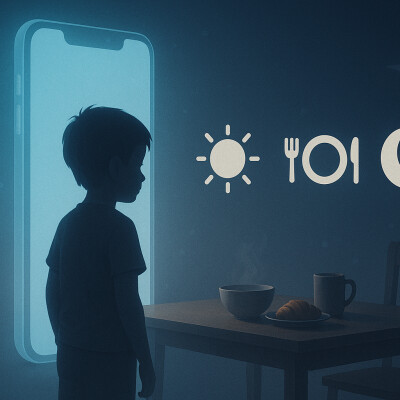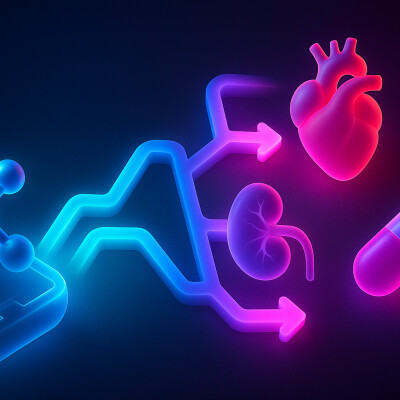Speaker #1Podcast, Levothyroxine. Understanding chronopharmacology, interactions, and best practices. Welcome to Science en Lumiere, the podcast that sheds light on our daily lives and health through science. Today, we will dive deep into a well-known medication, Levothyroxine. This treatment is prescribed to compensate for a lack of thyroid hormones, especially for people suffering from hypothyroidism. Did you know that to get the most out of Levothyroxine, It's essential to follow certain rules, such as the timing of the dose, avoiding specific drug interactions, and a few dietary tips. How can you recognize the signs of an incorrect dosage? That's what we'll discover together in this episode, written and produced by Christoph Blinn. Part 1. What is levothyroxine, and how does it work? Let's start with a quick reminder of what levothyroxine is. It is a synthetic hormone meant to replace thyroxine. a hormone naturally produced by the thyroid gland. This hormone is essential for regulating many bodily functions, including metabolism. When someone has hypothyroidism, it means their thyroid gland isn't producing enough thyroxine. Common symptoms include fatigue, weight gain, a feeling of cold, and sometimes mood disturbances. Levothyroxine is prescribed to compensate for this deficiency and help restore hormonal balance in the body. However, For this treatment to be fully effective, several factors must be considered, such as the correct timing of the dose and managing interactions with other substances. Part 2. Symptoms of Hypothyroidism and Hyperthyroidism. Before going any further, it's important to know the symptoms of hypothyroidism, but also of hyperthyroidism, which can occur if you take too much levothyroxine. Let's explore what hypothyroidism looks like clinically. Hypothyroidism is like a subtle but profound slowing down of your body. Fatigue becomes a constant, heavy companion, even after hours of rest. It manifests as varying degrees of weakness. You might gain weight without explanation, despite no changes in your diet, and you feel cold, even when others find the temperature comfortable. Your skin becomes dry, your hair weakens, and it's not just your joints that ache, sometimes it's your mood too. A depressive state or a dull apathy might set in, distancing you from the joys of daily life. Levothyroxine helps restore the lost balance, but this hormonal adjustment must be made with caution, as every body reacts differently. In most cases, blood tests reveal an elevated TSH thyroid-stimulating hormone level. Hypothyroidism can also present with more subtle psychological and cognitive symptoms, such as concentration difficulties, low motivation, or even difficulty completing daily tasks. These signs can sometimes be misdiagnosed, so it's important to talk to your doctor, especially if they persist or appear despite treatment. Now, what are the signs of hyperthyroidism? An excess of natural thyroid hormone or an overdose of levothyroxine can propel you into the opposite condition, hyperthyroidism. This time, it's a loss of control, with rapid weight loss that may be welcome at first but quickly becomes alarming. Tachycardia develops. Your heart races, sometimes beating irregularly, and your mind is overcome by constant nervousness, sometimes accompanied by tremors. You might feel as if a wave of heat is washing over you constantly, making the air seem unbreathable. Sleep escapes you, and every night becomes a struggle to find rest. These signs are a warning, it's time to consult your doctor to adjust the treatment and restore balance. Part 3, Chronopharmacology, Why the Timing of Your Dose is Essential. Chronopharmacology is the study of how the timing of medication intake affects its effectiveness. For levothyroxine, this concept is particularly important. The recommendations are clear, it's best to take levothyroxine in the morning on an empty stomach, ideally 30 minutes to an hour before breakfast. Why this specific timing? Because having food in your stomach can interfere with the absorption of the medication. An empty stomach ensures that the drug is absorbed effectively by the body. Some minerals can also significantly decrease the drug's absorption, as we will discuss later. After taking your levothyroxine, it is advised not to eat immediately to allow the medication time to be absorbed. Waiting at least 30 minutes to an hour before eating is recommended. An important and often overlooked point is the impact of certain dietary supplements, particularly biotin, found in products meant to strengthen hair and nails. If you're taking biotin supplements, be aware that it can distort thyroid function test results. It's advised to inform your doctor or temporarily stop taking biotin a few days before a blood test to avoid diagnostic errors. This is especially important because hypothyroidism can sometimes cause hair loss, prompting patients to take biotin supplements. Part 4. Drug and Food Interactions. Aside from the timing of your dose, It's essential to know the drug and food interactions that can influence levothyroxine's effectiveness. In addition to biotin, certain medications or supplements, such as calcium, iron, or even antacids, can interfere with the absorption of levothyroxine. It's crucial to space out their intake by at least four hours. Some cholesterol-lowering drugs, such as cholestyramine, as well as certain antidepressants like sertraline, fluoxetine, imipramine, and amitriptyline, can interact with levothyroxine by reducing its absorption or increasing its elimination. If you're taking these medications, an adjustment to your levothyroxine dose may be necessary upon starting them or after clinical and biological monitoring. Now, let's look at foods that can interfere with the action of this hormone. Foods high in fiber, such as whole grains, can slow the absorption of levothyroxine. This isn't a reason to avoid fiber. but it's recommended to space out its consumption from the time you take your medication. Soy, often consumed in daily diets, can also interfere with levothyroxine. Again, you don't need to eliminate soy from your diet, but make sure to space out its consumption from the time you take your medication. Caffeine can also pose a problem if you drink coffee immediately after taking levothyroxine. Wait at least 30 minutes before consuming caffeinated beverages. Part 5 Diet and Lifestyle Tips to Optimize Your Treatment To maximize the effectiveness of your levothyroxine treatment, here are a few lifestyle tips to follow. Daily routine. Take your levothyroxine at the same time each day, always on an empty stomach and with water, to maintain stable hormone levels. Avoid interactions. I prefer to repeat this for emphasis. If you're taking medications like iron, calcium supplements, or antacids, Space them out by at least 4 hours from your levothyroxine dose. Hydration. Drink enough water throughout the day to stay hydrated and help with medication absorption. Balanced meals. Maintain a balanced diet, but be mindful of fiber-rich foods and soy, as they can affect the absorption of your medication. Levothyroxine requires regular blood tests to ensure your dosage is still suited to your needs, especially if you experience symptoms of hypo-or hyperthyroidism. Conclusion Levothyroxine is an essential medication for many people suffering from hypothyroidism, but its effectiveness largely depends on how it is taken. Following best practices, such as taking the medication at the right time and managing drug interactions, optimizes its effects and minimizes risks. It is crucial to get regular blood tests to adjust your levothyroxine dosage, particularly based on TSH levels, but also according to your symptoms. Sometimes, Your symptoms can be better indicators than lab results when evaluating whether your treatment is appropriate. Biological tests alone should not justify changes in treatment if clinical signs are normal. Finally, I stress that levothyroxine dose adjustments should always be made gradually. Rapid changes in dosage can lead to significant side effects, whether in hypo or hyperthyroidism. It is therefore essential to follow your doctor's recommendations and adjust the dose step by step. Levothyroxine isn't only used in human medicine, but also plays an important role in veterinary medicine. In animals, especially dogs, hypothyroidism is a common condition that requires hormone replacement therapy. Levothyroxine is prescribed to compensate for thyroid hormone deficiency, just as it is in humans. Symptoms in animals include lethargy, weight gain, and coat problems. Restoring hormonal balance helps these animals regain their energy and well-being. Thank you for listening to this episode of Science en Lumiere, written and produced by Christophe Blin. If you found this episode helpful, consider subscribing and sharing this podcast with your friends. See you soon for a new topic on science and health. Don't hesitate to suggest themes that interest you.





